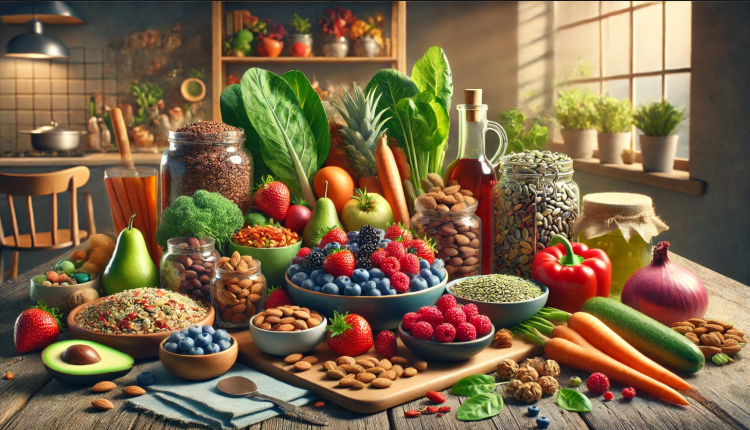Antioxidants are compounds that inhibit oxidation, a chemical reaction that can produce free radicals leading to cellular damage. Incorporating antioxidant-rich foods into one’s diet is essential for combating oxidative stress, thereby reducing the risk of chronic diseases and promoting overall health.
Understanding Antioxidants and Their Importance
Antioxidants neutralize free radicals—unstable molecules that can damage cells, proteins, and DNA. This neutralization helps prevent the chain reactions that lead to oxidative stress, which is associated with various chronic conditions, including cardiovascular diseases, cancers, and neurodegenerative disorders. By maintaining a balance between free radicals and antioxidants, the body can function optimally, reducing the likelihood of disease development.
Sources of Antioxidant-Rich Foods
A diverse range of foods provides antioxidants, each contributing uniquely to health:
- Fruits and Vegetables: Berries (such as blueberries, strawberries, and raspberries) are particularly high in antioxidants like flavonoids and vitamin C. Leafy greens, carrots, and tomatoes also offer substantial antioxidant properties, including beta-carotene and lycopene.
- Nuts and Seeds: Almonds, walnuts, and sunflower seeds contain vitamin E, a potent antioxidant that protects cell membranes from oxidative damage.
- Whole Grains: Whole grains like brown rice and quinoa are rich in selenium and zinc, minerals that play a role in antioxidant defense systems.
- Legumes: Beans and lentils provide polyphenols, which have antioxidant properties that help reduce inflammation.
- Beverages: Green tea and coffee are notable for their high antioxidant content, including catechins and chlorogenic acid, respectively.
Health Benefits of Antioxidant-Rich Diets
Incorporating antioxidant-rich foods into the diet offers several health benefits:
- Reduced Risk of Chronic Diseases: A diet high in antioxidants is associated with a lower risk of chronic illnesses, such as heart disease and certain cancers. Antioxidants help prevent the oxidation of LDL cholesterol, a key factor in the development of heart disease.
- Enhanced Immune Function: Vitamins C and E, found abundantly in fruits and vegetables, bolster the immune system by protecting immune cells from oxidative damage.
- Improved Cognitive Function: Antioxidants may slow age-related cognitive decline by reducing oxidative stress in the brain, potentially lowering the risk of neurodegenerative diseases like Alzheimer’s.
- Skin Health: Antioxidants such as vitamins C and E contribute to skin health by protecting against UV-induced damage and promoting collagen synthesis, leading to improved skin elasticity and reduced wrinkles.
Incorporating Antioxidant-Rich Foods into Your Diet
To maximize the benefits of antioxidants, consider the following dietary strategies:
- Diverse Intake: Consume a variety of fruits and vegetables to ensure a broad spectrum of antioxidants. Aim for a colorful plate, as different colors often indicate different types of antioxidants.
- Whole Foods: Prioritize whole, unprocessed foods over supplements to obtain antioxidants, as the synergistic effects of nutrients in whole foods are more beneficial.
- Cooking Methods: Be mindful of cooking methods, as some antioxidants can be sensitive to heat. For instance, steaming vegetables may preserve more antioxidants compared to boiling.
- Regular Consumption: Incorporate antioxidant-rich foods into each meal. For example, add berries to breakfast cereals, include a variety of vegetables in salads, and opt for nuts as snacks.
Potential Considerations
While antioxidants are beneficial, it’s important to approach their consumption thoughtfully:
- Supplementation Caution: High-dose antioxidant supplements may not provide the same benefits as antioxidants from food and can sometimes have adverse effects. Consult with a healthcare provider before beginning any supplementation.
- Balanced Diet: Relying solely on antioxidant-rich foods without considering overall nutrition may lead to imbalances. Ensure a well-rounded diet that includes adequate proteins, healthy fats, and carbohydrates.
Conclusion
Antioxidant-rich foods play a crucial role in maintaining health by protecting the body against oxidative stress and reducing the risk of chronic diseases. By incorporating a variety of these foods into your daily diet, you can enhance overall well-being and support long-term health.
- Advertisement -

